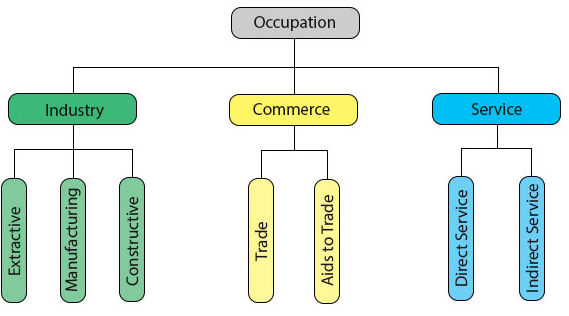Career could be described as a chosen profession or job which someone does for a long period of their life and in which they hope to gain achievement.
Types of Occupations
Occupation can broadly be classified into three divisions, namely; industry, commerce and service.
Industrial Occupations
These consist of all those occupations that work with free gifts of nature, changing them into finished goods and assembling the finished goods into forms usable to man.
There are three branches of industrial occupation, namely extractive occupations, manufacturing occupations and constructive occupations.
(a) Extractive occupations: They explore and exploit natural resources and free gifts of nature from land and sea e.g. agriculture, mining, fishing, quarrying etc.
(b) Manufacturing occupations: They are concerned with the processing and transforming raw materials into finished products e.g. textile,
(c) Constructive occupations: They are involved in all activities of assembling of goods manufactured into usable forms e.g. Bricklayers, road building, bridge construction etc.
Commercial Occupations
This is the process of buying, selling and distribution of goods and services. It includes trade and aids to trade.
Service Occupations
These are occupations that render services to the people. The people pay for the services directly or indirectly.

Examples of each classification are:
EVALUATION
Meaning of Career Opportunities
This refers to the various job opportunities that are available to people in the job market. As a commercial student, there are many different categories of careers open to such students. Such opportunities may be available in the public and private sectors.
Generally we can easily classify employment opportunities into two broad categories which were self employment and paid-employment opportunities.
Career Opportunities in Commerce
Career opportunities in commerce include the following;
(i) Insurance industry: Brokers, actuaries, underwriters, agents etc.
(ii) Banking/financial industry: Book keepers, account clerks, accountants, auditors, financial managers etc
(iii) Trading: Retailers, wholesalers, advertising agents, salesmen, sales representatives, managers, advertising agencies, purchasing agents etc
(iv) Transport industry: Transport agencies, transport officers, transport managers etc.
(v) Communication
(vi) Warehousing
(vii) Advertising
(viii) Personal selling
(ix) Purchasing
(x) Warehousing
(xi) Teaching: Teachers in secondary schools, lecturers in polytechnics and universities, bursars, registrars, etc.
EVALUATION
Requirements for Different Careers
Some factors that make an individual have either strong or weak points in relation to a career include the following:
(i) Experience: Some jobs require a lengthy period of experience. In such case an inexperienced person becomes unsuitable.
(ii) Education: Some career opportunities require a relatively high level of education.
(iii) Finance: This becomes important in the case of self-employment.
(iv) Natural talent: Some occupations require a lot of aptitude or inborn skills.
(v) People-orientation: Some jobs require good human relations
(vi) Fortitude: Some jobs are very challenging and rigorous-often in order to meet deadlines.
(vii) Initiative: Some jobs require a lot of initiative and foresight as in the case of self-employment capacity to venture and undertake risks.
EVALUATION
Read our disclaimer.
AD: Take Free online baptism course: Preachi.com 